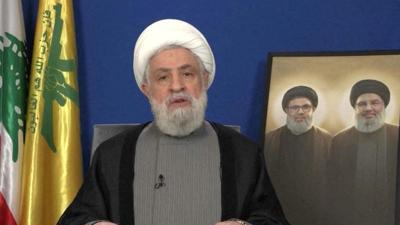Lebanon finds itself at a critical geopolitical crossroads as its powerful Iran-aligned militant group, Hezbollah, unequivocally rejects international calls for disarmament. This steadfast refusal intensifies a long-standing regional conflict, particularly as the United States escalates US pressure on Beirut to curb the group’s substantial arsenal, a move that Hezbollah’s leadership asserts directly benefits its adversary, Israel.
Sheikh Naim Qassem, a prominent leader of Hezbollah, delivered a forceful address stating that any demands for the group to surrender its weapons are, in essence, a capitulation to Israel. Qassem emphasized the organization’s unwavering commitment to its armed status, proclaiming that submission to external pressure, particularly from the US, is not an option when it comes to their strategic defense capabilities.
This current diplomatic impasse is deeply rooted in the tumultuous history of the Middle East conflict. Hezbollah emerged from a devastating war with Israel last year, a conflict that inflicted severe damage on the group, resulting in significant leadership losses, thousands of fighter casualties, and widespread displacement among its supporters, underscoring the profound impact of past confrontations on their present resolve.
In response to Hezbollah’s continued military posture, the United States has significantly increased its diplomatic efforts. Sources familiar with the matter indicate that Washington is now urging the Lebanese cabinet to issue a formal decision mandating the disarmament of Hezbollah before crucial talks on halting Israeli military operations in the country can resume, highlighting the high stakes involved in this diplomatic push.
Qassem directly accused U.S. special envoy Thomas Barrack of advocating for Hezbollah’s disarmament primarily for the benefit of Israel, rather than Lebanon’s genuine security interests. He asserted that the US demands to remove Hezbollah’s missiles and drones are driven by the fact that these weapons “scare” Israel, painting the US intervention as serving external rather than internal Lebanese stability.
The proposed disarmament deal, discussed during Barrack’s visit to Beirut in early July, outlined a scenario where Hezbollah would be fully disarmed within a four-month timeframe. In exchange, the agreement suggested the withdrawal of Israeli troops from several occupied posts in south Lebanon and a cessation of Israeli air strikes, presenting a complex framework for de-escalation that hinges on Hezbollah’s compliance.
The persistent defiance of Hezbollah regarding disarmament demands poses significant challenges to Lebanon’s sovereignty and regional stability. This ongoing struggle for control over its military capabilities not only influences internal Lebanese politics but also shapes the broader geopolitical landscape of the Middle East, with international powers closely watching for any shift in the delicate balance of power.
The intertwining of Lebanon Politics with the activities of powerful non-state actors like Hezbollah, coupled with intense external US Foreign Policy influence, creates a volatile environment. The potential for escalation remains a constant concern, with the future of regional conflict intricately tied to the outcomes of these high-stakes negotiations and declarations.





Leave a Reply